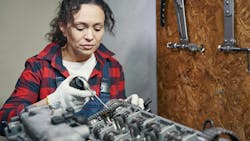This year, I was one of three contributors for FleetOwner’s, Fleet Maintenance’s sister publication, annual ‘Women in Transportation’ series. The goal of the series is to highlight the hard work of women in the transportation field, from technicians and drivers to managers and executives, and celebrate their accomplishments in a field where we are the minority.
So, I interviewed three smart, driven, and capable women: One association VP, one technician, and one shop owner, and shared their stories with the world. Not bad for a day’s work. But throughout the project, I couldn’t escape the feeling that something was off, as though I was in the Matrix and had noticed a glitch. It was nothing about the women themselves, of course, nor the overall project’s ostensibly noble goals. But still, I couldn’t forget the feeling. Now, with a couple months of hindsight, I think I finally know what bothered me so much.
First, some context: Back in 2022, not long before I joined Fleet Maintenance magazine, one of the big themes in the industry was that women only made up 2% of technicians. Industry panels discussed this, and I’ve attended various events and written stories highlighting how having so few women doesn’t make sense when the transportation industry is suffering from labor shortages. So, you’d think that that percentage would change over the course of two years, right? But no, as of January 26, 2024, the U.S. Bureau of Labor Statistics found that the percentage of female bus and truck mechanics and diesel engine specialists was still only 1.6%. According to the non-profit Women in Trucking Association, only 9.5% of professional drivers are women.
Representation struggles
When your representation is that small, it’s a foregone conclusion that every woman you speak to in trucking is something of a trailblazer. And you can bet she’s going to have some stories about times where her gender worked against her in both external and internal ways.
The external barriers are the easiest to recognize. Missy Albin, senior lead master technician for Taylor and Lloyd and International Trucks’ Female Technician Ambassador, has never had a women’s bathroom in a shop – instead, she’s always used the female customer or office bathroom. Bonnie Greenwood, a FedEx Freight technician based in Utah, was the first woman to win TMCFutureTech in 2017 and the first woman to earn second place at TMCSuperTech. But despite her skill, she’s still not immune to stereotyping.
“There's always that, I'll describe it as a bias, where people are surprised to see a woman working in the shop,” Greenwood said in her ‘Women in Transportation’ profile last year. “Unfortunately, we're still in that phase.”
Ashley Sowell, now co-founder and CEO of Integrity Fleet Services, rose to VP of accounting and HR at the fleet she used to work at, but despite “doing everything” from taxes, marketing, and HR, she was passed over for advancement in favor of a man she helped train. And even today, there’s still been times when she’ll get a call from a customer and they’ll say ‘Oh, honey, I need to talk to a man,’ she said.
These external pressures get the most press time – as they should, as symptoms of the larger issue in the CV repair segment. But those external problems lead to subtler internal pressures, too.
For instance, Se’ara Hart, a 23-year-old body and collision technician with Rush Enterprises, feels an added need to prove her place in the shop to both her peers and her customers.
“I always get nervous if I have to do something really quickly before [a truck] leaves and a customer sees me,” Hart said, "because I worry they’ll be like ‘Oh, a chick did it? Let me double-check this.’”
And in addition to the pressure to perform that most technicians feel, female techs have the additional lift of representing their gender.
“The right phrase might be that I feel an obligation to try to be a role model now that I've been given this platform,” Greenwood explained the feeling.
Finding success
But, of course, every woman in this industry has her stories of tenacity and success, too.
“The drivers that were surprised at first, thankfully are no longer,” Greenwood emphasized. “Sometimes they're the ones that will walk into the shop and be like, ‘Hey, is Bonnie here?’ And any of the other guys will say, ‘Well, yeah, why do you need her?’ and they're like, ‘Well, I just want her to work on my truck.’”
Read more: Experts share how to increase number of female techs in the vehicle repair industry
For Sowell, while she has struggled with being taken seriously by men, when she has the chance to demonstrate her expertise, “their attitude changes," Sowell noted. "Once they realize I actually do know what I'm talking about, there's a little bit more leeway.”
Albin said that her work during her pregnancy made her consider challenges differently in the shop, ultimately making her a stronger technician. And Hart has gone on to compete in Rush Enterprises’ Tech Skills Rodeo for two years in a row.
These conflicting experiences of struggle and success leave women in the industry in a strange place. They’re aware of how they are perceived differently while also wanting to be recognized for their work, not their gender.
As an example, Hart tends to get a bit more attention at Rush Rodeo when she’s competing.
“They have camera people come during [the competition], and when they see me start to touch something, they all swarm and start taking pictures,” Hart recalled. But for her, she doesn’t feel any different than any of her hard-working peers.
“I forget that,” Hart explained. “I just feel like any other person.”
This isn’t unique to female technicians, too. At Fullbay’s 2024 Diesel Connect, I heard a female shop owner observe that we’ve heard enough about what it’s like to be a woman in this industry before. And she’s right. If you read the articles and attend the talks about women in the commercial vehicle industry, you’re likely to hear similar stories of support that’s not given (or feels undeserved to be asked for) and struggles overcame.
And that is what bothered me about my work on this year’s ‘Women in Transportation’ series. I don’t mean to say that these women don’t deserve kudos – they’ve worked hard against difficult odds and achieved great things. But they shouldn’t be appreciated for their success only because they’ve achieved it as a female, nor should the industry use their stories as an excuse to forget that there’s a massive portion of the population that they aren’t tapping.
We know women are here to work, they want to work, and they can work very well in a shop. So do something about it.
If you’re a fleet recruiter or marketer, include women in your materials and ads. If you’re a teacher at a technical school, make sure girls know about your classes, too. If you’re a shop owner or manager, make sure you’ve got uniforms for women instead of only ones for men, and have a locker room for women if you can. If you’re a technician working alongside a female tech, support her when she asks questions. And do this every day, not just when these articles or panels pop up.
I don’t expect the percentage of technicians to rapidly grow from 1.6% in only two years. But I do hope that if the industry stops thinking of women as a novelty, then they’ll stop being one sooner rather than later.
About the Author

Alex Keenan
Alex Keenan is an Associate Editor for Fleet Maintenance magazine. She has written on a variety of topics for the past several years and recently joined the transportation industry, reviewing content covering technician challenges and breaking industry news. She holds a bachelor's degree in English from Colorado State University in Fort Collins, Colorado.
